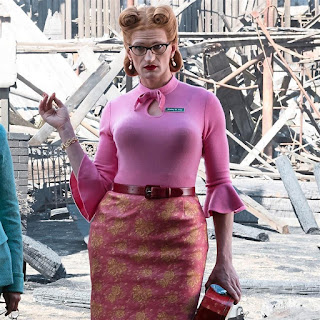Review: A Series Of Unfortunate Events - Who doesn’t like happy endings? When it comes to stories, we are almost conditioned to hope for all things to end well.
A Series Of Unfortunate Events, however, does not hesitate for one moment to dash those hopes right to the ground. In fact, the Netflix television series – much like the children’s book series it is based on – goes to every length to repeatedly remind you, the viewer, of its bleak premise. It actually urges you to stop watching, in order to save yourself the despair of what is to come next.
Even the theme song begins like this:
“Look away, look away… / This show will wreck your evening/ Your whole life and your day/ Every single episode is nothing but dismay.”
And yet, here is the subversive delight of this darkly comic show: despite these ample warnings, we not only feel compelled to continue watching, but somewhere deep in our hardened, cynical hearts, continue to hope for a happy ending.
There’s no real basis for why we do this. The series starts off with our protagonists – siblings Violet, Klaus and Sunny Baudelaire – being told their parents have died in a mysterious fire that burnt their family home to the ground.
They barely have time to grieve when they are whisked off to live with a distant relative, an actor named Count Olaf (Neil Patrick Harris). It quickly becomes clear, however, that Olaf is only interested in the Baudelaires’ family fortune, and will stop at nothing to get it.
The Baudelaires, though, are rather more than ordinary. Violet (Malina Weissman) is an inventor, Klaus (Louis Hynes) is a voracious reader with a great memory, and baby Sunny (Presley Smith) is an amazingly gifted biter. And so begins the children’s attempts to escape Olaf’s clutches. As they do, they learn that there was more to their parents than they knew.
The young actors are well cast (Presley, in particular, is absolutely adorable as the baby who, with the help of some clever CGI, seems to have an endless array of expressions), and hold their own against the much showier performances around them.
Chief among them is Harris. As Olaf, he gets to be gleefully over the top: a bad guy with a penchant for theatrics and bad disguises. It is pure comedic delight to see what outlandish persona Olaf will appear in next as he tries to capture the Baudelaires, particularly since the children spot him every single time.
Harris, however, understands that it is a fine line to tread between villainy and buffoonery, and lets the evil out in just the right amounts, resulting in some unexpectedly disturbing moments – such as when an erstwhile funny scene is instantly transformed when he suddenly strikes Klaus across the face, or when he ever so casually pushes someone off a boat to their death.
The show revels in such emotional sleight of hand. The children are constantly shown rays of hope, only to have them extinguished in ever more depressing ways. Adults entrusted to care for them end up being flawed characters who somehow let them down. So they really aren’t kidding about the series of unfortunate events.
Unexpectedly then, the heart of the show is a character called Lemony Snicket, which was the pen name of the books’ author Daniel Handler. One of the novels’ distinctive features was the author’s self-aware commentary, and here, that takes the form of Patrick Warburton, who breaks the fourth wall, documentary host-style, to address us directly. He starts off as narrator, claiming that he researched the Baudelaires’ story, but it soon becomes clear that he plays a much bigger part in the proceedings. And for all his sombre demeanour and dire pronouncements, he proves to be the one person we – and hopefully, the Baudelaires – can depend on.
Netflix has released eight episodes of the show so far, adapted from the first four volumes in the 13-book series, and they are as odd and enjoyable as the novels were.
Each book is broken up into two episodes, and a host of well-known actors put in immensely enjoyable turns as the various odd characters that pop up, including Aasif Mandvi, Alfre Woodard, Joan Cusack and Don Johnson.
Unlike the rather lacklustre 2004 movie adaptation, the show includes Handler in its writing team, and the results speak for themselves. The script strikes a perfect balance between comedy and drama with a healthy dose of quirk, and is translated brilliantly onto screen through the vision of Barry Sonnenfeld.
Known for directing offbeat projects like The Addams Family movies and the Men In Black trilogy, Sonnenfeld’s vision for the world of the Baudelaires looks like the combined dreams of Tim Burton and Wes Anderson. Scenes shift from candy-coloured suburbs to gothic interiors to steampunk-inspired set pieces, and it is to the show’s credit that it all feels exactly right.
A Series Of Unfortunate Events is, at its heart, a story about three intelligent, decent and caring children caught in a world of selfish, incompetent or dim-witted adults. And for all their resourcefulness, the Baudelaire children can’t seem to overcome the limits of their situation – ultimately, it is the people who call the shots, unsuited to the position as they may be, who determine the outcome of the story.
It is a theme that feels familiar to many of us: being forced to contend with leaders and people in charge who claim to have our interests at heart but are, at best, incapable and at worst, wicked. In many of our lives, we have been or still are the Baudelaire children.
And perhaps that is what compels us to keep watching, despite the lack of a happy ending. The Baudelaires’ lives are steeped in misfortune, and don’t seem to get any better. But onward they go, together, still hoping. Perhaps there is something to be said for that.



0 comments:
Post a Comment